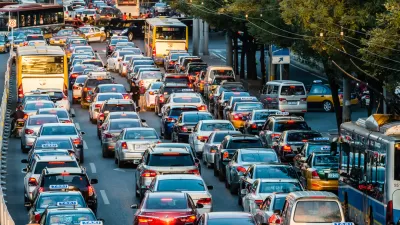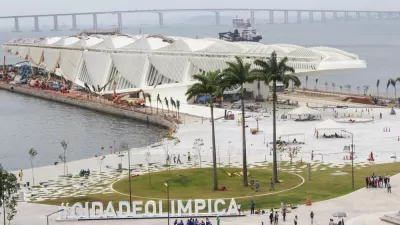As the start of London's summer games grows near, the competition to host the 2020 Olympics is heating up. Paul Sonne looks at whether the "shoestring" bid of Madrid, formed amidst Spain's austerity drive, can beat out the other finalists.
Since China poured an estimated $40 billion into Beijing's lavish 2008 coming out party, Olympic bids have generally headed in two distinct directions: cities with established infrastructure proposing more sustainable events that utilize existing facilities, and cities in emerging markets that can afford to spend more extravagantly.
Now Madrid, a finalist to host the 2020 Summer Games along with Istanbul and
Tokyo, is formulating a final bid to win an event it hopes, "would help bring 'economic and social recovery'
to Spain and boost employment, particularly for young Spaniards facing a
52% jobless rate."
According to Sonne, "The city's [Madrid's] bid committee is marketing the proposal as a shoestring
Olympics-a model designed to show how to organize the event on a tight
budget. Madrid's initial application says 78% of the sports venues
already exist in the city and only about nine structures need to be
built."
With Spain's government pushing through a €65 billion austerity program, critics are questioning if leaders should "pour public funds into a risky financial bet."
"This is not the moment to be thinking about this kind of event," says
José García Montalvo, an economics professor at Barcelona's Universitat
Pompeu Fabra, pointing to a contradiction: "If you claim that most of
the infrastructure is already built and you're not going to use a lot of
public money, then you're not going to [create] a lot of jobs."
FULL STORY: In Spain, a Thrifty Olympics Bid

Planetizen Federal Action Tracker
A weekly monitor of how Trump’s orders and actions are impacting planners and planning in America.

Maui's Vacation Rental Debate Turns Ugly
Verbal attacks, misinformation campaigns and fistfights plague a high-stakes debate to convert thousands of vacation rentals into long-term housing.

Restaurant Patios Were a Pandemic Win — Why Were They so Hard to Keep?
Social distancing requirements and changes in travel patterns prompted cities to pilot new uses for street and sidewalk space. Then it got complicated.

In California Battle of Housing vs. Environment, Housing Just Won
A new state law significantly limits the power of CEQA, an environmental review law that served as a powerful tool for blocking new development.

Boulder Eliminates Parking Minimums Citywide
Officials estimate the cost of building a single underground parking space at up to $100,000.

Orange County, Florida Adopts Largest US “Sprawl Repair” Code
The ‘Orange Code’ seeks to rectify decades of sprawl-inducing, car-oriented development.
Urban Design for Planners 1: Software Tools
This six-course series explores essential urban design concepts using open source software and equips planners with the tools they need to participate fully in the urban design process.
Planning for Universal Design
Learn the tools for implementing Universal Design in planning regulations.
Heyer Gruel & Associates PA
JM Goldson LLC
Custer County Colorado
City of Camden Redevelopment Agency
City of Astoria
Transportation Research & Education Center (TREC) at Portland State University
Jefferson Parish Government
Camden Redevelopment Agency
City of Claremont




























